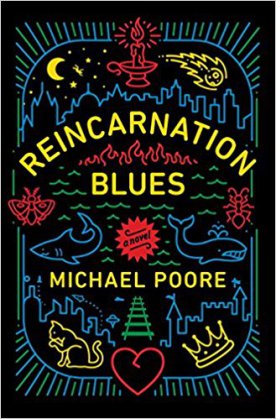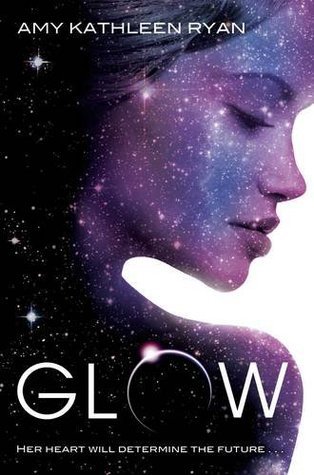 A good portion of the books I read are review copies, and while I’ve come to enjoy the chaos and unpredictability of reading books where I have zero expectations, there are definitely times where I’ve considered giving it up. (Why, yes, these times often correspond with long streaks of bad books – how did you know?) All of which goes to say, the joy of reviewing is that sometimes you get a book like Reincarnation Blues that can completely blindside you, coming out of nowhere and blowing you away with its imagination, humor, style, and richness.
A good portion of the books I read are review copies, and while I’ve come to enjoy the chaos and unpredictability of reading books where I have zero expectations, there are definitely times where I’ve considered giving it up. (Why, yes, these times often correspond with long streaks of bad books – how did you know?) All of which goes to say, the joy of reviewing is that sometimes you get a book like Reincarnation Blues that can completely blindside you, coming out of nowhere and blowing you away with its imagination, humor, style, and richness.
Trying to describe Reincarnation Blues is a bit of a rough task; the best I can do is to say that it combines the millennia-spanning reincarnated souls of Cloud Atlas with the untraditional but rich love story of The Time Traveler’s Wife, with a rich sprinkling of humor that’s oh so welcome. But even that description doesn’t really do the book justice – it doesn’t convey the richness of the storytelling, the quiet silliness, and most of all, the pure warmth of the whole experience.
Reincarnation Blues is the story of a soul named Milo, who’s among the oldest souls in the universe – he’s been reincarnated nearly 10,000 times. That’s given Milo an incredible amount of experience and learning, with lives lived in the ancient past, the distant future, and everywhere in between. But Milo’s favorite parts of existence are the parts in between his lives, where he gets the chance to reunite with the love of his “life”: Suzie…also known as Death. And once you add to that the impending threat of oblivion – because any soul that hasn’t achieved enlightenment by incarnation #10,000 doesn’t get another chance – and there’s a lot of pressure on Milo to figure some things out.
And yet, Reincarnation Blues never feels like a high pressure book. Yes, there’s this deadline looming, and yes, there’s this complicated idea of having a romance with the incarnation of Death, but Reincarnation Blues remains focused, both in plot and thematic terms, on the nature of the human experience – on learning to be kind, on listening to other people, on trying to accept the universe for what it is. It’s a book that’s never really about all of Milo’s lives, despite the way it weaves in and out all of them, giving us scenes of combat, of peace, of future science, of primitive tribes, and every possible combination of all of those. It’s about what Milo did and learned in those lives, and the experiences that shaped him into the person he is.
And yet, there’s no denying that Poore’s incredible imagination gives the book a life that’s undeniable, and maybe all the more effective for how he backgrounds it throughout. More than that, the way he weaves all of Milo’s lives into one complex history – with actions in one life being referenced in another – give the sense of a complex mythology behind the book, a carefully planned out reality that we only get glimpses of. Add to that his quietly funny, sometimes silly writing style, and you have a book that succeeds in no small part to the authorial craft on display in every page.
But more than the imagination, more than the humor, what really made Reincarnation Blues work for me was the warmth of the whole novel. This is a book where the stakes revolve around finding a successful relationship and achieving some sort of internal peace and calm with the universe. And to that end, for all of the drama, for all of the stakes in each individual life that Milo leads, the book is more about connecting to other people, about learning the importance of how we relate to each other and the legacies we leave behind. That’s a great message to receive, but also a rich one, one that’s so welcome in days where we feel constantly pushed against each other. And it’s the thing that really sold me on this book – that, and the great writing, and the rich imagination, and the wonderful characters, and the great humor…well, maybe I just loved all of it, and loved it so much.
Amazon Advertisements Share this:




